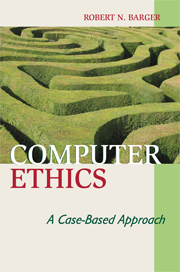Book contents
- Frontmatter
- Contents
- Preface
- Acknowledgments
- 1 Introduction
- 2 The Computer as a Humanizing Agent
- 3 Philosophic Belief Systems
- 4 A Philosophic Inventory
- 5 The Possibility of a Unifying Ethical Theory
- 6 The Ethical Decision-Making Process
- 7 Psychology and Computer Ethics
- 8 The Computing Field as a Profession
- 9 Computer-Related Codes of Ethics
- 10 Computer Ethics and International Development
- 11 Robotics and Ethics
- 12 Theft and Piracy Concerns
- 13 Cases Concerning Theft and Piracy
- 14 Privacy Concerns
- 15 Cases Concerning Privacy
- 16 Power Concerns
- 17 Cases Concerning Power
- 18 A Miscellaneous Collection of Cases
- 19 Parasitic Computing Case
- Appendix: Topics for Presentations, Discussions, and Papers
- Notes
- Selected Bibliography
- Index
4 - A Philosophic Inventory
Published online by Cambridge University Press: 05 June 2012
- Frontmatter
- Contents
- Preface
- Acknowledgments
- 1 Introduction
- 2 The Computer as a Humanizing Agent
- 3 Philosophic Belief Systems
- 4 A Philosophic Inventory
- 5 The Possibility of a Unifying Ethical Theory
- 6 The Ethical Decision-Making Process
- 7 Psychology and Computer Ethics
- 8 The Computing Field as a Profession
- 9 Computer-Related Codes of Ethics
- 10 Computer Ethics and International Development
- 11 Robotics and Ethics
- 12 Theft and Piracy Concerns
- 13 Cases Concerning Theft and Piracy
- 14 Privacy Concerns
- 15 Cases Concerning Privacy
- 16 Power Concerns
- 17 Cases Concerning Power
- 18 A Miscellaneous Collection of Cases
- 19 Parasitic Computing Case
- Appendix: Topics for Presentations, Discussions, and Papers
- Notes
- Selected Bibliography
- Index
Summary
Introduction
In this chapter you will have the opportunity to complete a philosophic inventory and learn with which philosophic theories you are most in agreement. Answer each of the questions as follows: if you strongly agree, put 2; if you agree, put 1; if you are undecided, put 0; if you disagree, put −1; and if you strongly disagree, put −2.
Inventory Questions
earning is a process of interacting with people and things around us. It leads to new understandings which can then be used to solve social problems.
he human person is primarily a nervous system that is influenced by interaction with the physical environment along lines recognized by science.
ducation should lead a person to spiritual understanding.
nowledge involves successful adaptation to our surroundings.
nowledge is accurate if it reflects physical, material reality.
he human person is basically a spiritual being.
he human person discovers knowledge from the physical, material world.
nowledge is meant to be used. It is ultimately a means to survival.
ducation is basically a process of spiritual growth.
Good is anything that results in achieving a goal agreed upon by society.
Knowledge is found by considering the practical implications of ideas.
The human mind is simply the brain at work.
Learning is a process of choosing our identity.
The mind is a spiritual entity that determines what reality is (rather than reality determining what the mind is).
All true knowledge engages the feelings of the knower.
The most important thing in reality is the ability to choose or decide.
[…]
- Type
- Chapter
- Information
- Computer EthicsA Case-based Approach, pp. 59 - 64Publisher: Cambridge University PressPrint publication year: 2008



